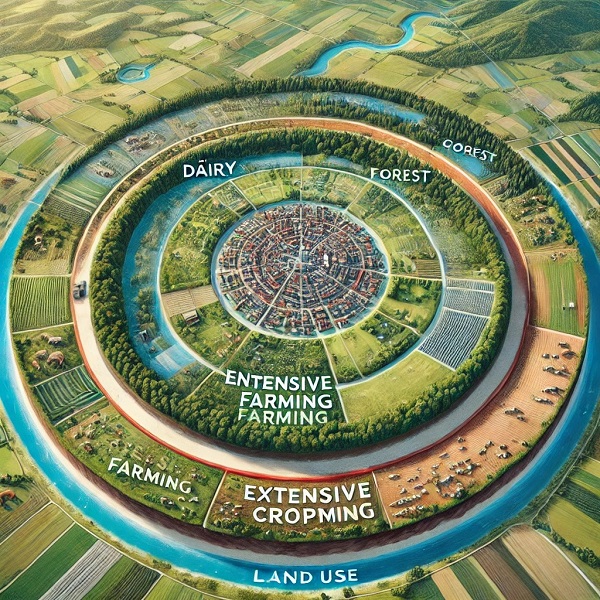Von Thünen’s model of agricultural land use provides a framework that explains how different types of farming are organized around a central market, based on transportation costs and land value. Here’s how his theory could have contributed to preventing global food shortages:
1. Optimal Land Use: By prioritizing crop types based on their distance from the market, farmers could maximize yield and minimize transportation costs. This could lead to more efficient use of land, potentially increasing food production.
2. Localized Production: Encouraging local production of food close to urban centers could reduce reliance on long supply chains, making food systems more resilient to disruptions. This decentralization would help maintain steady food supplies even in times of crisis.
3. Diverse Cropping Systems: Von Thünen’s model suggests that different crops are best suited to specific locations. By promoting a variety of crops suited to local conditions, regions could avoid reliance on a few staple crops, reducing vulnerability to pests and climate change impacts.
4. Sustainable Practices: Understanding the relationship between land use and market access could lead to more sustainable agricultural practices, helping to preserve soil health and increase long-term food security.
5. Policy Development: Governments could use von Thünen’s insights to create policies that encourage appropriate land use planning and investment in local infrastructure, supporting farmers in optimizing their production relative to market demand.
6. Education and Training: By educating farmers about the principles of the model, they could make more informed decisions about crop selection and resource allocation, potentially increasing overall food production.
Implementing these principles on a global scale, while adapting to local contexts, could contribute significantly to reducing the risk of food shortages.
Von Thunen’s theory of agricultural land use could have potentially prevented the global food shortage crisis that we are currently facing. By understanding the principles of von Thunen’s model, which considers the spatial organization of agricultural activities based on transportation costs and market proximity, policymakers and farmers could have implemented more efficient and sustainable farming practices.
Additionally, the theory highlights the importance of diversifying agricultural production to meet the varying demands of the market, further bolstering food security and stability. While implementing Von Thunen’s theory would not completely eradicate global food shortages, it could certainly help to alleviate the growing challenges we are currently facing.
You can also check other interesting articles to read
